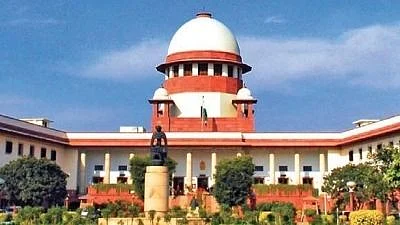The Centre on Tuesday, 23 March, informed the Supreme Court that the Information Technology (Intermediary Guidelines and Digital Media Ethics Code) Rules, 2021, were introduced after receiving several complaints from Members of Parliament, civil society and chief ministers regarding the content being streamed on Over The Top (OTT) platforms, reported PTI.
The Centre added that there was a need to bring in an institutional mechanism to check content on the platforms and ensure that they adhered to the Digital Media Ethics Code.
The Union Ministry of Information & Broadcasting argued their case in their affidavit in response to a plea by Advocate Shashank Shekhar Jha and co-petitioner Apurva Arhatia who asked for the setting up of a Central Board for Regulation and Monitoring of online video content, an autonomous body to regulate audio visual content on OTT platforms, like Netflix and Amazon Prime, reported Bar and Bench.
What The Centre Said
The Centre averred that it had been consulting with stakeholders over the past two years and had notified the new rules on February 25, which will put in a code of ethics for OTT players, online media, news, current affairs and a redressal of grievances.
“It is respectfully submitted that the answering respondent is seized of the need for developing an institutional mechanism regarding regulation of audio-visual content streamed on OTT platforms and has been in active consultation with stakeholders over the period of the last two years,” said the Centre, as quoted by PTI.
The Centre added that the IT Rules, 2021, provided for a balanced self-classification of the content on five age-based categories for viewers, and other countries like Singapore, Australia, Europe have framed similar mechanisms for regulating content on OTT platforms.
The Centre’s affidavit stated that it had amended the Allocation of Business Rules, 1961, through a gazette dated 9 November 2020, bringing it within the purview of the I&B Ministry, reported Bar and Bench.
The petitioner contended that there weren’t rules to prohibit obscene content, to which the Centre stated that the IT act provisions will deal with the same, but it does not serve as a guide on what content can be published on the platforms, added the report.
The Centre further noted that Jha’s plea must be dismissed because the Centre has a mechanism in place to regulate content on OTT platforms, according to the report.
The Plea
The SC bench, headed by Chief Justice of India SA Bobde, had on 15 October last year, asked the Centre to respond to the plea by Jha and Arhatia. Bobde had initially asked the petitioner to withdraw the plea, but the petitioners insisted it be tagged as a pending plea, reported Bar and Bench.
The plea asked for an independent autonomous body to regulate OTT platforms, stating that none of the streaming platforms, including Netflix, Amazon Prime, Zee5 and Hotstar, had not signed the self-regulation provided by the Ministry of Information and Broadcasting since February 2020, added the report.
“With cinema theatres unlikely to open anytime soon in the country, OTT/streaming and different digital media platforms have surely given a way out for filmmakers and artists to release their content without being worried about getting clearance certificates for their films and series from the censor board,” submitted the plea as per the report.
The plea noted that lack of legislations governing OTT platforms had become evident and that “the government was facing heat to fill this lacuna with regulations from the public and the Judiciary. Still the relevant government departments have not done anything significant to regularise these OTT/streaming platforms”, reported PTI.
(With inputs from PTI and Bar and Bench)
(At The Quint, we question everything. Play an active role in shaping our journalism by becoming a member today.)
